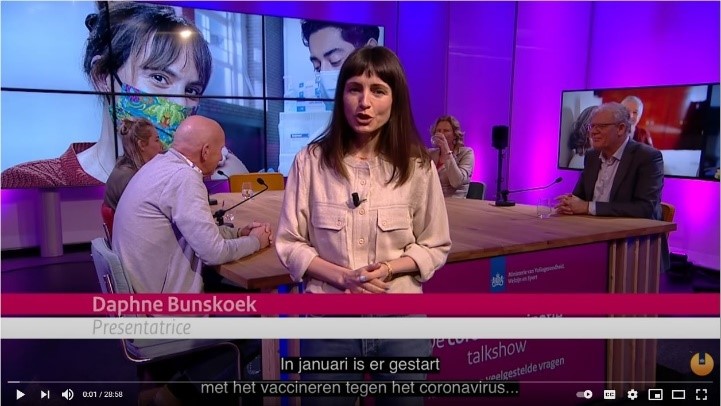Colophon
20 April 2021
The newsletter on COVID-19-vaccination is an RIVM publication with up-to-date information for professionals involved in COVID-19 vaccination.
Progress report on the COVID-19 vaccination campaign
RIVM estimates that nearly 3.8 million vaccinations have been administered by 11 April. This is higher than previous figures that were reported, because RIVM is applying a new method of calculating the estimates. For example, the calculations assume 1% rather than 5% wastage, because far fewer vaccine doses are lost in actual practice than had originally been thought.
The Minister’s decision to stop vaccinating with the AstraZeneca vaccine for people under 60 has a direct impact on five groups: people at higher risk for medical reasons who are unable to travel, people with Down’s syndrome and people with morbid obesity, employees working in long-term care, employees and clients in mental healthcare institutions, and hospital employees who have direct contact with patients. They already had an appointment to get vaccinated, or would have received the invitation very soon. Over the course of this week and next week, they will receive an invitation to be vaccinated with a different vaccine. People with Down’s syndrome and people with morbid obesity (BMI >40) born in 1961 or later, who have not yet been vaccinated, will receive a vaccination invitation from their GP. They will be vaccinated with the Pfizer/BioNTech vaccine at a vaccination site operated by the Municipal Public Health Services (GGDs).
The first people born in 1952 will be receiving an invitation for a COVID-19 vaccination this week. They will also be vaccinated by the GGD with the Pfizer/BioNTech vaccine.
Janssen vaccine
The first Janssen vaccines arrived at the Movianto vaccine storage facility in Oss on 12 April. On Tuesday 13 April, however, the manufacturer decided to temporarily postpone deliveries of the vaccine to Europe and other countries. For now, Janssen has also asked the recipient countries not to start using the vaccines they had already received. It is not yet clear what implications this will have for the vaccination strategy.
The reason for the manufacturer’s decision is that six women between the ages of 18 and 48 in the USA have developed the same unusual blood clots in combination with low platelet counts that were seen in the context of the AstraZeneca vaccine. It should be noted that it is not yet clear whether this can be attributed to the vaccine. The Pharmacovigilance Risk Assessment Committee (PRAC) of the European Medicines Agency (EMA) is researching the situation and expects to present a recommendation next week.
Advisory reports of the Health Council of the Netherlands
Vaccination of children
Earlier this month, the Health Council of the Netherlands advised priority COVID-19 vaccination with the Pfizer/BioNTech (Comirnaty®) vaccine for children aged 16 and 17 (born in 2003, 2004 and 2005) who are in one of the medical high-risk groups. This vaccine has been approved for people aged 16 years and older.
Extended interval between first and second vaccination
The Health Council also advises extending the interval between the first and second vaccination with the Pfizer/BioNTech (now 6 weeks) and Moderna vaccines (now 4 weeks) to 12 weeks for as long as vaccines are in short supply. This does not apply to people in the high-risk patient groups whose immune systems are severely compromised.
Ministerial decree on vaccination strategy
The Minister is adopting the Health Council’s advice regarding vaccination of children aged 16 and 17 who are in one of the medical high-risk groups. Additionally, children aged 16 and 17 who are living in a residential institution for people with intellectual disabilities will be invited for vaccination. RIVM is consulting with vaccinators on how these children can be made eligible for vaccination as soon as possible.
The Minister is looking into the consequences of delaying the second vaccination with the Pfizer/BioNTech and Moderna vaccines before deciding on this matter. In that context, he is also considering the impact on vaccination willingness and the implementation of the vaccination strategy.
GPs are vaccinating patients born in 1956 through 1960 (aged 60-64 years), among others, with the AstraZeneca vaccine. GPs have the option to invite people born in 1955 or before for vaccination if they still have enough vaccine doses left over afterwards. People born in 1961 or later who had previously received a first vaccination with the AstraZeneca vaccine will also be offered a second vaccination with this vaccine. People born in 1961 or later who have not yet received a first vaccination will receive one of the other vaccines. More details are available in the letter to Parliament and the RIVM news item on this topic.
Updated implementation guidelines for COVID-19 vaccination
The implementation guidelines for COVID-19 vaccination 2021 have been updated. The latest version of the implementation guidelines is always available online (in Dutch). Section 1.3 outlines the main changes compared to the previous version; more minor interim changes are listed under Version Management (at the end of the document).
100 GGD vaccination sites
Many more vaccination sites operated by the Municipal Public Health Services (GGDs) have been added: the 100th site was opened this week in Dalfsen.
Public communication
Please note: a falsified vaccination invitation claiming to be sent by RIVM is now circulating. This fake invitation promises vaccination in exchange for payment. RIVM would like to emphasise that this is not an official RIVM communication. For more information, see the news item on this topic.
People who want to know more about vaccination with the AstraZeneca vaccine (Vaxzevria®) can find the latest information here.
The Ministry of Health, Welfare and Sport (VWS) commissioned a talk show in which a number of experts answer questions about COVID-19 vaccination. The panel includes a nurse and a person over 60. Daphne Bunskoek is the presenter. The talk show can be viewed on YouTube.
Upcoming events
Extra attention will be focused on COVID-19 vaccination in various ways in the next few weeks. (Please note: all events are exclusively in Dutch.)
- Thursday 22 April 2021, 12:15-13:00 hrs: online explanation of 10th report on ‘Inventory of Dutch COVID-19 studies: prevention and care & broad societal issues’ – themes: lifestyle and physical health (RIVM Corona Behavioural Unit, registration via coronagedragsunit@rivm.nl).
Editors
Editors: Vaccination implementation, National Coordination Centre for Communicable Diseases Control (LCI).
For questions and/or comments about this newsletter, healthcare professionals can send a message to vaccin-covid@rivm.nl.
Private citizens can call the public information number 0800 - 1351 with their questions.




